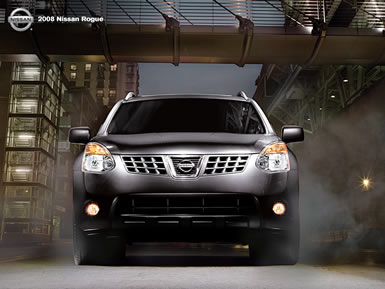|

CROSSOVER REVIEW:
The Rogue, Nissanís latest foray into the crossover segment, is meant
for urban adventures. Even its optional all-wheel-drive system is
designed for great cornering on road rather than for climbing over rocks
or traversing rugged dirt roads.
Nobody at Nissan seems
concerned that Rambler used the Rogue name in the 1950s and 1960s. Their
target buyers, 30-somethings, werenít even born yet, so they wonít
likely remember any of the AMC models. Nissan aims to offer greater
utility and passenger capacity to young families outgrowing their sporty
coupes and small sedans who still want to have some fun on the road.
With styling based
strongly on Nissanís successful, larger Murano crossover, the Rogue has
little in common with boxy offroad-style SUVs. The nose is tapered and
sleek, and the hood rolls up to a laid-back windshield. The small,
sharply drawn bulges around the wheelwells convey performance more than
rugged offroad intent. The rear glass is curved and far from
rectangular. The lozenge-shaped taillamps bulge out of the fat rear
quarter panels. Itís a great look with attitude.
Inside, the dash has a
sporty coupe feel, with gauges tucked into a round-topped binnacle,
vents that pop out of the dash and taper backwards, and plenty of
silvery accents. The main gauges use sporty white on black while the
small center circle glows orange while displaying fuel level and
temperature, and mileage info if so equipped.
The Rogue is just a bit
bigger than most of the competition, so rear passengers ride in comfort.
My grown son commented on the remarkable accommodations. This
spaciousness could help buyers choose a Rogue over a competing model.
Rogues come in two
levels, S and SL, with front- or all-wheel drive available in either
model. Beyond that, you choose from eight colors with names like Venom
Red and Wicked Black. My SL tester with front-wheel drive came in
Phantom White.
Every Rogue gets with
four-wheel vented disc brakes with anti-lock and other electronic
features. It also has power windows with one-touch auto-down for the
driver, power mirrors, air conditioning, cruise control, trip computer,
variable windshield wipers, remote keyless entry, and more.
The SL bumps the S
modelís 16-inch steel wheels to 17-inch alloys, adds roof rails,
installs polished stainless steel exhaust tips, and gives you rear
privacy glass. Inside, besides upgraded seat cloth, SLs have rear heater
ducts, visor vanity mirrors, a cargo light, and two extra seat
adjustments.
The SL level gives you
entry into the option list. My tester had the $1,900 Premium Package,
which upgrades the standard audio system to a Bose setup, adds XM
Satellite Radio, and includes a long list of conveniences, electronic
and practical. You can order a leather package on the SL all-wheel-drive
model, although the rugged cloth in my tester looked and felt fine.
To provide adequate
oomph for the 3,200 to 3,400 pound car, Nissan dropped in its 2.5-liter
170-horsepower inline four. It felt up to the job during my test week.
In all Rogues, the 175
lb.-ft. of torque runs through Nissanís Xtronic continuously variable
transmission (CVT). This technology uses two pulleys with a sturdy belt
connecting them. A CVT has an infinite number of gear ratios, depending
on where the belt is positioned on each pulley as determined by the
transmissionís computer. This is designed to improve performance and
fuel economy.
However, if you really
want to have more of a say in the matter, you can manually shift ratios.
And you can order optional steering-wheel-mounted paddle shifters in the
SL models.
The EPAís official fuel
economy numbers are 22 City, 27 highway for the two-wheel-drive model. I
averaged 20.9 mpg. Thatís pretty typical, because nobody drives in the
ideal, standardized conditions used by EPA testers.
The Green Vehicle Guide
numbers look good. I found two versions listed. All Rogues score 7 for
the Greenhouse Gases number but the Air Pollution score is either a 6 or
a 9. Be sure which one you are looking at when you order yours, a 9
represents a super ultra low emission vehicle (SULEV), which is
something you can feel good about.
The Rogue S with
front-wheel drive starts at $19,995, including destination charges. The
SL with all-wheel drive bases at $22,735. The all-wheel-drive S and
front-wheel drive SL squeeze in between. Thatís a pretty narrow price
range. My SL two-wheel-drive tester came to only $23,425. In todayís
price market, that feels like a bargain.
Nissan is a little late
to the small crossover party, but may have brought the best package.
Though Iím way past the target demographic, I felt very comfortable in
the Rogue. A mid size crossover certainly makes a lot more sense in the
todayís world than a huge SUV.
By Steve Schaefer
© AutoWire.Net
Byline: CROSSOVER
Review provided by Tony Leopardo © AutoWire.Net

Nissan Home Page
Column Name: The Rogue
has a great look with attitude
Topic: The 2008 Nissan
Rogue
Word Count: 853
Photo Caption: The
2008 Nissan Rogue
Photo Credits: Nissan
Rogue Internet Media
Series #: 2008 - 43
Download
the Microsoft Word version here:
2008 Nissan Rogue
Download the Original Image File here:
2008 Nissan Rogue


|
